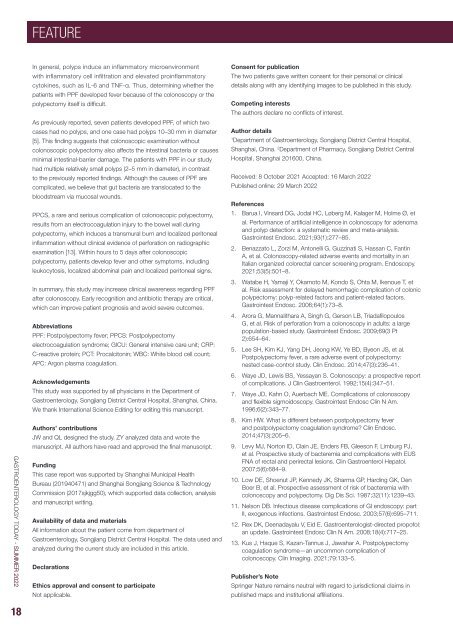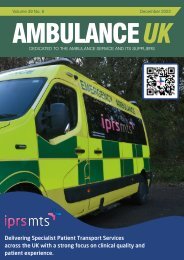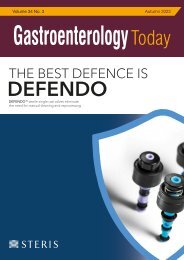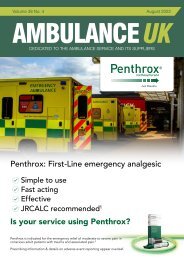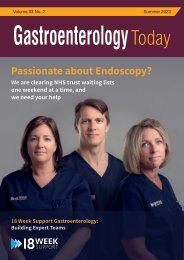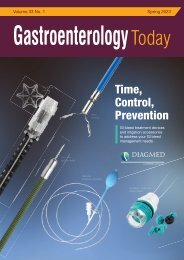Gastroenterology Today Summer 2022
Gastroenterology Today Summer 2022
Gastroenterology Today Summer 2022
Create successful ePaper yourself
Turn your PDF publications into a flip-book with our unique Google optimized e-Paper software.
FEATURE<br />
GASTROENTEROLOGY TODAY - SUMMER <strong>2022</strong><br />
In general, polyps induce an inflammatory microenvironment<br />
with inflammatory cell infiltration and elevated proinflammatory<br />
cytokines, such as IL-6 and TNF-α. Thus, determining whether the<br />
patients with PPF developed fever because of the colonoscopy or the<br />
polypectomy itself is difficult.<br />
As previously reported, seven patients developed PPF, of which two<br />
cases had no polyps, and one case had polyps 10–30 mm in diameter<br />
[5]. This finding suggests that colonoscopic examination without<br />
colonoscopic polypectomy also affects the intestinal bacteria or causes<br />
minimal intestinal-barrier damage. The patients with PPF in our study<br />
had multiple relatively small polyps (2–5 mm in diameter), in contrast<br />
to the previously reported findings. Although the causes of PPF are<br />
complicated, we believe that gut bacteria are translocated to the<br />
bloodstream via mucosal wounds.<br />
PPCS, a rare and serious complication of colonoscopic polypectomy,<br />
results from an electrocoagulation injury to the bowel wall during<br />
polypectomy, which induces a transmural burn and localized peritoneal<br />
inflammation without clinical evidence of perforation on radiographic<br />
examination [13]. Within hours to 5 days after colonoscopic<br />
polypectomy, patients develop fever and other symptoms, including<br />
leukocytosis, localized abdominal pain and localized peritoneal signs.<br />
In summary, this study may increase clinical awareness regarding PPF<br />
after colonoscopy. Early recognition and antibiotic therapy are critical,<br />
which can improve patient prognosis and avoid severe outcomes.<br />
Abbreviations<br />
PPF: Postpolypectomy fever; PPCS: Postpolypectomy<br />
electrocoagulation syndrome; GICU: General intensive care unit; CRP:<br />
C-reactive protein; PCT: Procalcitonin; WBC: White blood cell count;<br />
APC: Argon plasma coagulation.<br />
Acknowledgements<br />
This study was supported by all physicians in the Department of<br />
<strong>Gastroenterology</strong>, Songjiang District Central Hospital, Shanghai, China.<br />
We thank International Science Editing for editing this manuscript.<br />
Authors’ contributions<br />
JW and QL designed the study. ZY analyzed data and wrote the<br />
manuscript. All authors have read and approved the final manuscript.<br />
Funding<br />
This case report was supported by Shanghai Municipal Health<br />
Bureau (201940471) and Shanghai Songjiang Science & Technology<br />
Commission (2017sjkjgg50), which supported data collection, analysis<br />
and manuscript writing.<br />
Availability of data and materials<br />
All information about the patient come from department of<br />
<strong>Gastroenterology</strong>, Songjiang District Central Hospital. The data used and<br />
analyzed during the current study are included in this article.<br />
Declarations<br />
Ethics approval and consent to participate<br />
Not applicable.<br />
Consent for publication<br />
The two patients gave written consent for their personal or clinical<br />
details along with any identifying images to be published in this study.<br />
Competing interests<br />
The authors declare no conflicts of interest.<br />
Author details<br />
1<br />
Department of <strong>Gastroenterology</strong>, Songjiang District Central Hospital,<br />
Shanghai, China. 2 Department of Pharmacy, Songjiang District Central<br />
Hospital, Shanghai 201600, China.<br />
Received: 8 October 2021 Accepted: 16 March <strong>2022</strong><br />
Published online: 29 March <strong>2022</strong><br />
References<br />
1. Barua I, Vinsard DG, Jodal HC, Løberg M, Kalager M, Holme Ø, et<br />
al. Performance of artificial intelligence in colonoscopy for adenoma<br />
and polyp detection: a systematic review and meta-analysis.<br />
Gastrointest Endosc. 2021;93(1):277–85.<br />
2. Benazzato L, Zorzi M, Antonelli G, Guzzinati S, Hassan C, Fantin<br />
A, et al. Colonoscopy-related adverse events and mortality in an<br />
Italian organized colorectal cancer screening program. Endoscopy.<br />
2021;53(5):501–8.<br />
3. Watabe H, Yamaji Y, Okamoto M, Kondo S, Ohta M, Ikenoue T, et<br />
al. Risk assessment for delayed hemorrhagic complication of colonic<br />
polypectomy: polyp-related factors and patient-related factors.<br />
Gastrointest Endosc. 2006;64(1):73–8.<br />
4. Arora G, Mannalithara A, Singh G, Gerson LB, Triadafilopoulos<br />
G, et al. Risk of perforation from a colonoscopy in adults: a large<br />
population-based study. Gastrointest Endosc. 2009;69(3 Pt<br />
2):654–64.<br />
5. Lee SH, Kim KJ, Yang DH, Jeong KW, Ye BD, Byeon JS, et al.<br />
Postpolypectomy fever, a rare adverse event of polypectomy:<br />
nested case-control study. Clin Endosc. 2014;47(3):236–41.<br />
6. Waye JD, Lewis BS, Yessayan S. Colonoscopy: a prospective report<br />
of complications. J Clin Gastroenterol. 1992;15(4):347–51.<br />
7. Waye JD, Kahn O, Auerbach ME. Complications of colonoscopy<br />
and flexible sigmoidoscopy. Gastrointest Endosc Clin N Am.<br />
1996;6(2):343–77.<br />
8. Kim HW. What is different between postpolypectomy fever<br />
and postpolypectomy coagulation syndrome? Clin Endosc.<br />
2014;47(3):205–6.<br />
9. Levy MJ, Norton ID, Clain JE, Enders FB, Gleeson F, Limburg PJ,<br />
et al. Prospective study of bacteremia and complications with EUS<br />
FNA of rectal and perirectal lesions. Clin Gastroenterol Hepatol.<br />
2007;5(6):684–9.<br />
10. Low DE, Shoenut JP, Kennedy JK, Sharma GP, Harding GK, Den<br />
Boer B, et al. Prospective assessment of risk of bacteremia with<br />
colonoscopy and polypectomy. Dig Dis Sci. 1987;32(11):1239–43.<br />
11. Nelson DB. Infectious disease complications of GI endoscopy: part<br />
II, exogenous infections. Gastrointest Endosc. 2003;57(6):695–711.<br />
12. Rex DK, Deenadayalu V, Eid E. Gastroenterologist-directed propofol:<br />
an update. Gastrointest Endosc Clin N Am. 2008;18(4):717–25.<br />
13. Kus J, Haque S, Kazan-Tannus J, Jawahar A. Postpolypectomy<br />
coagulation syndrome—an uncommon complication of<br />
colonoscopy. Clin Imaging. 2021;79:133–5.<br />
Publisher’s Note<br />
Springer Nature remains neutral with regard to jurisdictional claims in<br />
published maps and institutional affiliations.<br />
18


